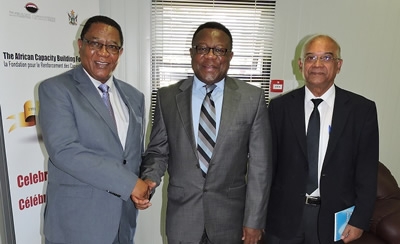
The Executive Secretary for the African Capacity Building Foundation (ACBF), Professor Emmanuel Nnadozie, met with the Secretary General for the Common Market for East and Southern Africa (COMESA), Dr. Sindiso Ngwenya on Friday 23 September, 2016, at the former’s headquarters in Harare. The courtesy call focused primarily on the continued collaboration between the two organizations.
The ACBF has been and continues to support COMESA in enhancing capacity of its secretariat to support economic and trade policy analysis and research. Dr. Ngwenya expressed his gratitude to the support that ACBF is giving not just to COMESA but to the whole Continent. The two Executives conceded that the project was progressing well and viewed the collaboration and support that ACBF is providing as very critical in enhancing COMESA’s key mandate in promoting Africa’s regional integration process and development. They also discussed other implementation modalities that would enhance the efficiency of the project as it moves towards its finalisation and conclusion in March 2017.
The COMESA Secretary General also briefed the Executive Secretary for ACBF on the upcoming 36th Council of Ministers and 19th Summit of Heads of State and Government, which will be held in Antananarivo, Madagascar under the theme, “Inclusive and Sustainable Industrialization” in October. He explained that the Summit will focus more on dealing with the structural transformation issues affecting industrialization and job creation in Africa; as addressing these obstacles will move the continent forward in its transformation agenda. He stated that capacity development of RECs will continue to be very critical in this discourse as human skills and strong institutions play a critical role in transforming Africa.
In the pursuing discussions, Professor Nnadozie, reaffirmed the Foundation’s support in enhancing regional integration in Africa and was pleased to note that with ACBF’s support, Regional Economic Communities, including COMESA, are becoming stronger over the years and more effective in executing their mandates. He took the opportunity to appraise his counterpart on the Foundation’s new Strategy for 2017-2021, wherein ACBF will continue to focus more on capacity development to address implementation bottlenecks in the Continent. He cited with concern that whilst Africa has the right strategies and development plans, the major challenge has been to translate these strategies into action plans and to mobilize resources to support their implementation. This is exacerbated by lack of enforcement mechanisms to ensure that countries implement what they agree on, at national, regional and continental levels. For these reasons, the continent has remained stuck with good strategies but not significant progress in industrialization and transformation.
He explained that the new Strategy will leverage on the investments that the Foundation has made in the past 25 years in Capacity development to promote utilization and retention of capacities in Africa to ensure implementation of continental strategies and priorities. He emphasized that part of the Strategy service lines is to support RECs and national government in the drive for domestic resource mobilization and that support would be required from RECs like COMESA to make use of this service.
Dr. Ngwenya further echoed the need for African countries to learn from each other in progressing their economies as there is no need to “invent a new wheel”. Comparing Africa to Asian economies, he expressed fears that in the coming Millennium, Africa might become an ‘Observatory Centre for failed development’ due to lack of implementation of agreements at Heads of States Summits and Meetings. He also expressed his concern on Africa’s lack of systematic follow up mechanisms to seminars and conferences where very important and progressive decisions and agreements have been made. To quote, he says “Agreement in Africa does not equal Action”, consequently implementation has always lagged.
The two Executives agreed that going forward, their strategic alliance will be key in developing implementation capacities in the continent.





